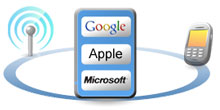Software to Rule the New Mobile Market
October 8th, 2008 by jeremychone The value chain used to be one of the main differences between the mobile and PC markets. The PC industry was driven by software vendors (i.e., Microsoft, Apple, Oracle), while the mobile industry was controlled by the Telcos and device manufacturers. For a long time, the Telcos even had the power to remove features from devices that they felt caused too much competition with their own service offerings. For example, tethering and other features frequently were disabled on early versions of Windows Mobile devices. Interestingly, iPhones 3G, despite its flying pixels, still does not have tethering nor allows it. I am not sure if it is an iPhone limitation or another example of Telcos control.
The value chain used to be one of the main differences between the mobile and PC markets. The PC industry was driven by software vendors (i.e., Microsoft, Apple, Oracle), while the mobile industry was controlled by the Telcos and device manufacturers. For a long time, the Telcos even had the power to remove features from devices that they felt caused too much competition with their own service offerings. For example, tethering and other features frequently were disabled on early versions of Windows Mobile devices. Interestingly, iPhones 3G, despite its flying pixels, still does not have tethering nor allows it. I am not sure if it is an iPhone limitation or another example of Telcos control.
I think that the main reason why mobile email has taken so long to be widely deployed was the reluctance from the Telcos to enable a competing technology that infringes on their highly profitable text messaging (SMS) and promising rich messaging (MMS) services.
As they successfully accomplished for text messaging and ringtones, the Telcos wanted to charge users for sending a rich message, watching a movie, streaming a video, downloading an application, and any other service beyond voice calls.
In short, the Telcos DID NOT want to be restricted to just being “the pipe,” as they have been confined in the wired world.
Well, as software giants such as Apple, Google, and Microsoft are aggressively entering the mobile space, the Telcos have slowly but surely become just that… a pipe…once again.
Speed, coverage, and price have become their core differentiators, and as in the wired world, users are now making decisions that are based on software (e.g., iPhone vs. Android vs. WinMobile) and application ecosytems.
For example, without a fee, mobile users can now do the following (outside of “the pipe’s” fees):
- Send rich messages: email
- Sync email, calendars, address books: Exchange, Google Email/Calendar.
- Get full geolocation services (mapping, directions, traffic): Google Map
- Stream Live Video: Qik
While Microsoft and Google are taking a traditional software approach to the mobile market, Apple has been cleverly playing a dual game (as they also are doing in the music industry). On one hand, they are playing the “exclusive and lock” Telcos game by the book, to the point of being overzealous about preventing users from unlocking devices. On the other hand, they are virtually writing off the Telcos from the application market by providing their own application store.
Nevertheless, I still think the Telcos have some interesting market opportunities. First of all, as more users require additional bandwidth, Telcos will see their premium bandwidth demand going up, especially for Video (I pay an additional $40 per month for unlimited 3G). In addition, given that the mobile application market is about to explode, Telcos should be able to capitalize by creating their own application market place that can compete against the iPhone store.
October 17th, 2008 at 10:04 am
[...] Bits And Buzz, by Jeremy Chone Technology, trends, and opportunities. « Software to Rule the New Mobile Market [...]
December 4th, 2008 at 7:08 pm
I never knew that Telcos has done such things before big mobile phone companys like Apple intergrated in the mobile business. Thanks, I never knew that:)
June 23rd, 2009 at 2:25 pm
adding this to twitter great info.